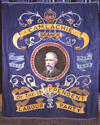 The years of the Great War and immediately after saw Glasgow acquire its reputation for industrial militancy and political radicalism. While historians continue to debate the significance of "Red Clydeside", there is no doubt that a new political landscape emerged in these years. With a newly expanded electorate encompassing women and the poor, and with social reform, particularly over housing, dominating the political agenda, it was the Labour Party that was best placed to benefit. The patriotic mood and absence of many Labour supporters from electoral register in 1918 only delayed Labour's rise. As Liberalism imploded, never again to become a significant force in Glasgow, the Labour Party won ten of the City's fifteen parliamentary seats in 1922, a seismic shift in political allegiances.
The years of the Great War and immediately after saw Glasgow acquire its reputation for industrial militancy and political radicalism. While historians continue to debate the significance of "Red Clydeside", there is no doubt that a new political landscape emerged in these years. With a newly expanded electorate encompassing women and the poor, and with social reform, particularly over housing, dominating the political agenda, it was the Labour Party that was best placed to benefit. The patriotic mood and absence of many Labour supporters from electoral register in 1918 only delayed Labour's rise. As Liberalism imploded, never again to become a significant force in Glasgow, the Labour Party won ten of the City's fifteen parliamentary seats in 1922, a seismic shift in political allegiances.
 However, Labour control of municipal affairs had to wait until 1933, in circumstances that were peculiar to say the least. The "heart" of the Party – the Independent Labour Party (ILP) –disaffiliated in 1932 and chose to stand its own candidates, while at the same time the Scottish Protestant League (SPL), a militantly anti-Catholic body, appeared on the scene. Labour and the ILP made little headway against each other, but the SPL had a dramatic impact on the ruling Moderate Party, (a "non-political" alliance of Unionists and Liberals). As the Moderate vote was split, Labour achieved its long-awaited majority.
However, Labour control of municipal affairs had to wait until 1933, in circumstances that were peculiar to say the least. The "heart" of the Party – the Independent Labour Party (ILP) –disaffiliated in 1932 and chose to stand its own candidates, while at the same time the Scottish Protestant League (SPL), a militantly anti-Catholic body, appeared on the scene. Labour and the ILP made little headway against each other, but the SPL had a dramatic impact on the ruling Moderate Party, (a "non-political" alliance of Unionists and Liberals). As the Moderate vote was split, Labour achieved its long-awaited majority.
 Although the later 1940s saw Labour lose both its parliamentary and municipal predominance, these were temporary setbacks and by the early 1950s Labour's primacy in Glasgow was secure once again.
Although the later 1940s saw Labour lose both its parliamentary and municipal predominance, these were temporary setbacks and by the early 1950s Labour's primacy in Glasgow was secure once again.